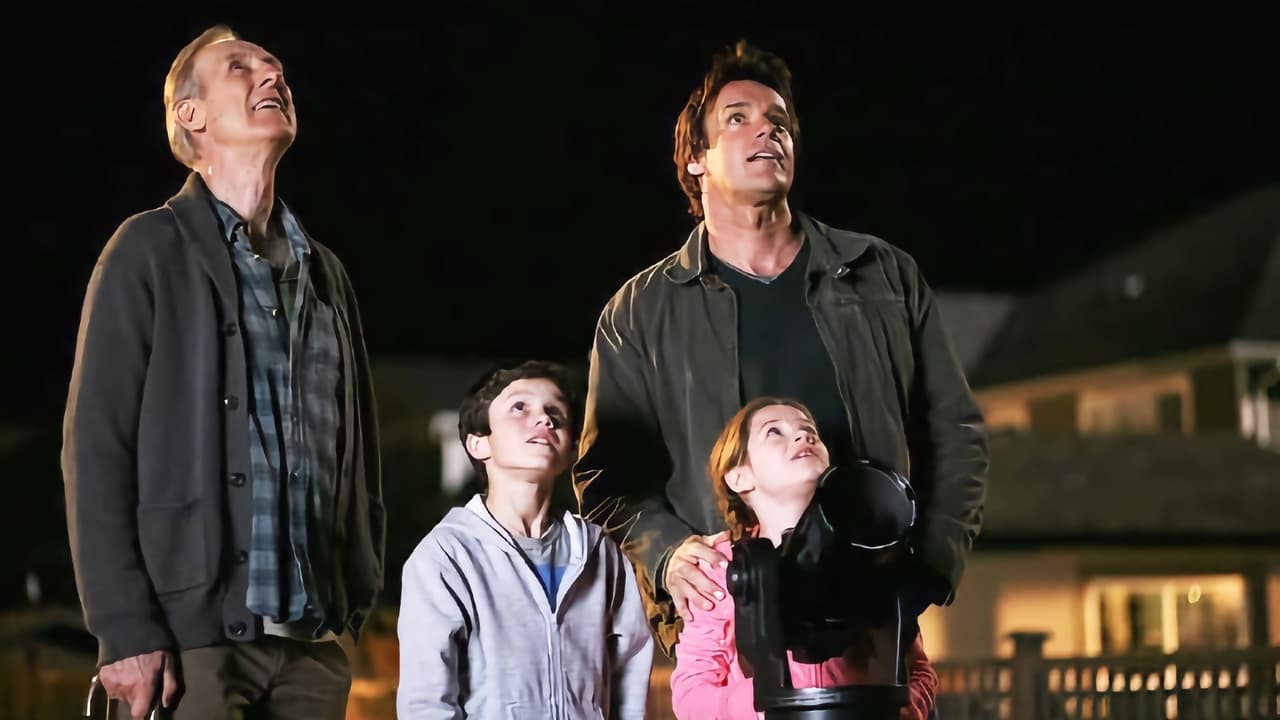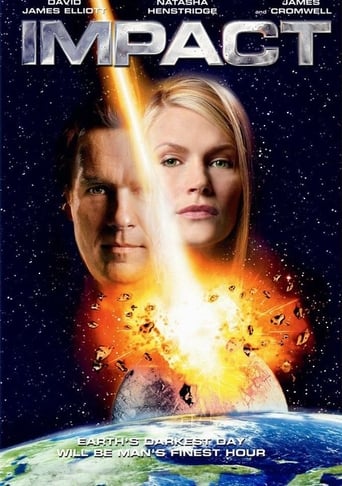

It’s fine. It's literally the definition of a fine movie. You’ve seen it before, you know every beat and outcome before the characters even do. Only question is how much escapism you’re looking for.
... View MoreIt really made me laugh, but for some moments I was tearing up because I could relate so much.
... View MoreOne of the best movies of the year! Incredible from the beginning to the end.
... View MoreIt's the kind of movie you'll want to see a second time with someone who hasn't seen it yet, to remember what it was like to watch it for the first time.
... View MoreImpact is basically a 'disaster movie' but on television (Think 'a Michael Bay film, but without the budget or stars). An asteroid has only gone and knocked the moon out of orbit and now our former lunar buddy is on a collision course for Earth, dooming the lot of us.But don't worry, seeing as Bruce Willis and Ben Affleck were unavailable to fly up there and blow it out of the stars, we have a team of international boffins who will come up with something to save us all. In the end they simply must have watched Armageddon, as they decide to fly up there and blow it up (just with worse special effects).Most people could probably put aside the slightly dubious special effects and lack of big-name actors and give Impact a chance. However, its main problem is simply its lack of originality. Even if you do leave out the dodgy scientific theories behind the scenario, what you have here is one disaster movie cliché after another. The dialogue is horrendous and even when the action does pick up a bit and focus on the (slightly) more interesting characters, it keeps hopping back to some severely boring ones (aka their various families, who all happen to have put themselves in perilous danger at the same time).I was never that much of a fan of Armageddon. I found it too over-the-top and daft to really enjoy properly. However, after watching Impact, give me Steve Tyler's 'I Don't Want to Miss a Thing' any day.
... View MoreThough there weren't elements the same as the hit 1998 Michael Bay film, Armageddon, there were some elements VERY similar. The story plot, that the moon was hit by an asteroid many times the size of the one that killed off the dinosaurs, was actually pretty good, CG could've been a little better, but not everyone is Michael Bay. The part I did not like the most is the part on the moon, to me it wasn't suspenseful, and I don't like the fact that they pretty much split the moon in half. Kind of like in Armageddon. Other than those it was OK. Probably a 3 out of 5. But if you are an Armageddon fan like me, don't watch this movie.
... View MoreThe last review I did was for 'Tornado Valley', the summary title I put for that was 'But...but...tornadoes do not work that way!', and as you can see from the summary title for this review, this is now the second, wait, third film I have seen where the makers of the film have broken the laws of reality.First problem, whether it was a dwarf star or something else that doesn't make sense, it still has to be one big freaking meteor to knock the MOON out of orbit.By the way, that's the plot, the moon gets knocked out of orbit and is on a collision course with Earth. That hasn't been done before ("Cough! Armageddon! Cough! Deep Impact!...wait, those were meteors, this is a moon...). Okay, let's face it, it's a brilliant idea, one that certainly got my interest. SO WHY RUIN IT?! You know it's gonna suck when night falls all around the globe!So guess what the (first) stereotypical military American solution to saving the planet is? Blow it up with pretty much every nuclear missile the US has. Which the people of Earth can see, somehow, through space. Because it worked so well in 'Independence Day', 'The Crazies 2010', 'The Return of the Living Dead', 'Mars Attacks', 'The Last War', 'Atomic Train',.... Also, it's a moon! It controls our oceans, destroying it will screw with the planet. And you're gonna need a lot more missiles than the film portrayed to blow it up. Which was true. The inevitable failure occurred. And whilst the scientists were looking at the effects, I was saying "You've angered off the moon and it's coming at you faster,". I cried when this actually proved to be the case! The moon "has increased velocity,"! HOW IS THAT EVEN POSSIBLE?!Then we have THAT floating scene. The scene which starts off with a container ship and its contents floating upwards before moving onto cars. Now I did yell 'WHAT?!' at the screen. I'm not an expert on the moon or magnetism, but I do remember vaguely something about the magnetic field the moon has, so okay that may explain...bales of hay are now floating up...is this now gravity? Then why aren't the sea levels rising? That's what the moon controls.After the floating scene ends...for no apparent reason, we follow a grandpa (James Cromwell...why the Hell were you in this? You should be doing better!) and two kids (Don't know their character/real names, don't care), who spot a café. The kids run off and grandpa says "Careful now,", I say "Be careful running around the burning wreckage,". So the kids go into the café, see some water, start drinking it and the owner tries to kick them out for it. Grandpa comes in and beats him with a stick. Yes. The café owner is in the wrong. Not the two kids who were stealing precious supplies. Sure, there was a lot of water, but the point remains!I could go on about the stupid scenes but I need to get on. Clichés. You can probably do a drinking game on the number of clichés in this. Heartfelt message from the president, obvious romance, and the American solution of blowing stuff up included.The special effects are quite good for a television movie series. The acting however is quite good, at least the actors and actresses sure do redeem the film slightly. It's just the common problem for films you generally see on SyFy...DIALOGUE AND SCENES! The scenes I have already gone over, and a great example of dialogue is Grandpa telling the café owner to let go of the kids, two seconds later hitting the café owner with his stick, despite the next shot showing the kids behind Grandpa, indicating that the café owner wasn't even holding the kids when Grandpa told him to let go.Right, I'm wrapping it up. This film(s) makes no sense, and the scenes and clichés will drive you nuts. Watch at your own peril.
... View MoreOK so there are some problems with this movie I'll give you that but still I want to focus on the positives. I give it a 6 out of 10 for those.1 The acting is okay. For those who don't agree: We had a politician here who made a campaign film, now that was bad acting! 2 It's internationally oriented. For once it is not just the United States who is affected and who magically saves the world. Actually the Europeans and Russians play their part.3 Even if it is just for a brief moment the Germans and French talked German and French. For the rest of the movie regional accents are heard. Not the whole world speaks American English.4 It was enjoyable to watch if you don't focus to much on the negatives.The trouble I had with it are the following: 1 It's scientific basis is as good as a 1950's movie there are a lot of things that don't add up. It's fine for a movie back then but now moviegoers know more and are therefor more demanding on this point. They should have taken a little more care in getting the basics right, even if the higher science doesn't add up.2 that the US would decide on this without consulting it's international partners (I believe that China, Russia, the EU and others would want a say in that and all hell would break loose if they didn't get a say) this would be the spoilerisch bit, even if I believe anyone would see this coming. 3 that the US president would be stupid enough to prefer the option of the army over the option presented by a large international team of scientists (who are in consensus for once). Especially when the option by the military is considered as counterproductive for years by scientists and administrators for years.
... View More